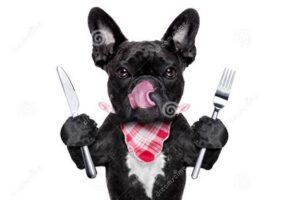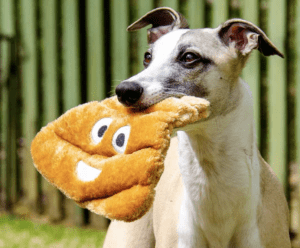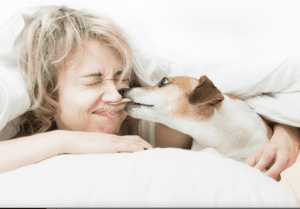Why Does My Dog Eat Their Poop?
Dogs have been our loyal companions for thousands of years, and while they bring us immeasurable joy and love, some of their behaviors can leave us puzzled and yes, even disgusted. You know where I am going with this! Why does my dog eat their poop?
One such behavior is eating poop…gross! There is actually a name for this and it is called “coprophagy”, the act of eating feces. It’s not uncommon for pet parents to witness their furry friends doing more than sniffing their own waste at times. And for those of us that have both cat and dog fur babies, we are probably aware that our pup will indulge in cat litter box treasures, most of us know as “kitty roca” when they get a chance.
So, Why Does My Dog Eat Their POOP?
Let’s talk about some of the reasons our pups do at times “eat their own poop” and what we can do to minimize this stinky situation.


-
Instincts from Ancestral Wolves:
To comprehend why some dogs eat poop, we must delve into their ancestral past. Dogs share a common ancestor with wolves, who were scavengers and opportunistic hunters. In the wild, wolves often consume the entire carcass of their prey, including the digestive tract, to maximize nutrient intake and minimize waste. This survival instinct may explain why dogs sometimes exhibit coprophagy – they perceive the feces as a potential source of nutrition.
-
Poor Digestion & Nutritional Deficiencies:
One of the most prominent theories regarding coprophagy in dogs revolves around nutritional deficiencies. Some experts suggest that dogs may resort to eating feces as a means to obtain missing nutrients or digestive enzymes that were not adequately absorbed during the initial digestion process. This behavior is more common in dogs fed a low-quality diet lacking essential nutrients. By consuming feces, dogs attempt to compensate for their nutritional deficiencies. Also consider that if this is the case, then the dog is most likely not able to digest their food properly – check out my last article on “leaky gut“. Believe it or not, the microbiome is also involved in this phenomenon. This study conducted by researchers from the University of California, Davis explores the link between coprophagia and the microbial composition of a dog’s gut.
-
Environmental Factors:
Another factor that can contribute to coprophagy is the environment in which dogs are raised. Puppies, in particular, are highly influenced by their surroundings and can develop “poop eating” tendencies if exposed to feces early in life. In multi-dog households, the scent of feces from one dog can attract others, leading to coprophagy as a form of social learning. Additionally, dogs that spend significant amounts of time in confined spaces, such as kennels or small yards, may become bored or anxious, leading them to eating poop as a self-stimulating behavior.
-
Behavioral Reasons:
While the aforementioned reasons focus on the physiological aspects of coprophagy, behavioral factors should not be overlooked. Dogs are social creatures that seek attention and may resort to eating feces as a means to gain their owner’s attention, albeit negative attention. In some cases, dogs may develop coprophagy as a compulsive behavior or a response to stress, anxiety, or boredom. It is essential to identify any underlying behavioral issues and address them appropriately through training, enrichment, and behavioral modification techniques.
How Do I Get my Dog to Stop Eating Their Poop?
I am being a bit light hearted because it is not a serious health issue in most cases, it is simply DISGUSTING! If you have experienced, as I have, your pup walking in the house and you start looking around for where the poop smell is coming from…only to realize it is on their breath! Well, you know what I mean. So, here are some things we can do in no particular order.
-
Maintain a Clean Environment:
One of the most effective ways to prevent coprophagy is to promptly clean up after your dog. Remove feces from your yard or litter boxes regularly to minimize access and temptation. This is actually very important for many reasons. Keeping the yard clean also keeps your pups or you from bringing it in the house! We just built a doggie compost so our garbage can is no longer filled with POOP! More on that another time.
-
Distraction and Redirection:
When you catch your dog in the act of eating poop, intervene by using a firm “No” or “Leave it” command. Immediately redirect their attention to a more desirable activity, such as playing with a toy or engaging in a training session.
-
Consistent Training:
Teach your dog basic obedience commands like “Leave it” or “Drop it” to have better control over their behavior. Practice these commands regularly and reward your dog with treats and praise when they respond correctly. Really learning these commands is not only important in this situation, but can be critical on a walk if they are starting to or if they do pick up something hazardous to their health. Getting them to drop it or leave it quickly is key! My colleague, Jessica Fisher offers some amazing dog training on line if you want some guidance.
-
Improve Diet and Nutrition:
Ensure that your dog is receiving a nutritionally balanced diet appropriate for their needs. Book a call with me if you are looking to identify any nutritional deficiencies. A passion of mine is to help pet parents support their fur babies with nutrient rich diets. Our dogs and cats are now showing signs of malnutrition and chronic illness from overly processed foods. Let me know if you would like to consider any adjustments to their diet.
-
Supplementation:
In some cases, adding specific supplements to your dog’s diet, such as enzymes or probiotics, may help improve their digestion and reduce the urge to consume feces. The enzymes work to support the breakdown of food with the goal of more nutrition being delivered and less ending up in the poop. Probiotics work on the diversity of the large intestine, which as you read above can play a role in their desire to eat their own poop. This is something that I would most likely recommend along with dietary and lifestyle changes.
-
Environmental Enrichment:


-
Attention:
Keep a close eye on your dog when they are outside or in areas where feces may be present. Use a leash to maintain control and prevent access to waste. If you have multiple pets, keep an eye on their activity and be ready to scoop the poop.
-
Taste Aversion (last option if at all):
For me, this would be the final consideration if you know what I mean. If you just can’t make headway and really feel like something needs to be done to get your pup to stop eating poop then consider this possible solution. One example of this is For-Bid, you would need to consult your veterinarian. It is made from highly purified crystalline edible protein fraction and when consumed causes the pup to experience an unpleasant taste from the “treated” poop. I’m not a fan simply because there is no way it is 100% safe and it is not 100% effective. But, if you are in a situation where you have tried everything then it’s an option.
Oh Please, Just Sweet Kisses!
Remember, every dog is unique, and it may take time and consistency to modify their behavior. If the problem 

I hope this article lets you know that you are not alone. Many dogs will lick at or eat poop at some point(s) during their lifetime. It is certainly disgusting and we really don’t want them to do it, but it isn’t something to be terribly concerned about. I would love to hear about your experience with your pup and whether or not they have eaten their poop at times. What worked for you?
